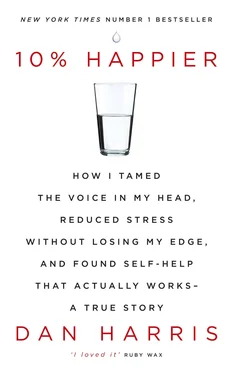I idolized Jennings. My whole on-air style was a straight-to-video version of his. I had studied his intricate anchor desk ballet—the masterful mix of slow leans, head nods, and arched eyebrows. I admired his ability to be smooth, and yet emote without being mawkish. He was the epitome of the voice-of-God anchorman, with a personal mystique to boot: the 007 looks, the four wives, the rumored celebrity trysts.
He was the colossus who sat astride ABC News. Internally, his broadcast was referred to simply as “The Show,” almost as if we didn’t have other major broadcasts like 20/20 , GMA , and Nightline . He was also the object of bottomless fear. I hadn’t met him yet, but I’d already heard the stories about his volcanic temper. Because of his reputation for eating his young, the executives deliberately scheduled my first appearance on his show for July 4, a day they knew he would be on vacation.
I did a feature story about baby boomers going back to work as lifeguards because all the young people were taking jobs with dotcom companies. When it aired, the show’s producers seemed satisfied with the piece, but I never heard from Jennings himself. I didn’t know if he’d been watching, or if he even knew who I was.
A few weeks later, I was at the apartment I shared with my younger brother, Matt, riding the exercise bike we’d set up in the living room, when my landline, cell phone, and pager went off in rapid succession. I got off the bike and checked the pager. It read, “4040.” This was the extension for the World News Tonight “rim,” the area where Peter and his senior producers spent the day putting together the show. I called in, and the young assistant who answered the phone put me on hold. Then a man picked up and said, “I think we need to start covering Ralph Nader. His campaign is picking up speed. Can you do it?” I looked over at Matt and mouthed, “I think this is Peter Jennings.”
The next day, I was on a plane to Madison, Wisconsin, to interview Nader and file a piece for that night’s broadcast. It was a hectic, harrowing process, exacerbated by the fact that, late in the day, Peter requested a series of significant changes to the script I had written. We managed to “make air,” but just barely. When I got back to my hotel room and dialed into the Internet, I saw that I had a two-word email from Peter: “Call me.” So I did. Immediately. I was expecting him to ream me out for writing a subpar script, but the first thing he said was, “Wear lighter-colored shirts.” He then proceeded to inform me that he’d been named to People ’s Best Dressed list based entirely on clothes he ordered from catalogues.
That sealed it. For the next five years, Peter was my mentor and, sometimes, tormentor. Anchoring the overnight show was now off the table. I had, improbably, become a network news correspondent. They gave me a set of business cards and my very first office, on the fourth floor of the building, alongside five other correspondents, all men several decades older than I was. Our offices were arrayed along a catwalk that overlooked the set from which Peter anchored his show. One morning, shortly after I moved in, I got off the elevator and the other reporters were huddled together, chatting. None of them would speak to me. It was awkward and a little bit intimidating, but if this was the price I had to pay for scoring this job a full decade before I thought it could happen, it was totally worth it.
Working for Peter was like sticking your head in a lion’s mouth: thrilling, but not particularly safe. He was frightening for a lot of reasons: he was about a foot taller than me, he was subject to sudden and unpredictable mood swings, and—even though he was originally from Canada—he was a bona fide American icon, which made it surreally mortifying when he yelled at you. He seemed to take pleasure in embarrassing me, preferably in front of as many people as possible. Once, his assistant called me down to the rim, saying Peter needed to discuss something. When I arrived, Peter looked up, did a double take, and eyeing my plaid jacket, said, “You’re not going to wear that on television, are you?” Everyone laughed uncomfortably. I turned fuchsia, and muttered something about how of course I wasn’t. I may have subsequently burned it.
But the real flash point—as with every correspondent—was the script-writing process. Peter was an exacting and irascible editor, and he often made changes at the last minute, sending producers and correspondents into frenzied scrambles minutes before airtime. Even when he affected a more-in-sadness-than-in-anger tone to his revisions, I strongly suspected that he actually enjoyed the power play. He had a set of semi-rational writing rules that every correspondent learned to obey over the course of a particularly rigorous hazing period: don’t start a sentence with “but”; don’t say “like” when you can say “such as”; never, ever use the word “meanwhile.”
By no means were all of Peter’s standards arbitrary, though. After observing and interacting with him for a while, it became clear that he cared deeply about this work. He saw his job as a privilege—a sacred trust with the audience, and a vital part of a functioning democracy. He was a congenital contrarian who expected his staff to aggressively question authority (including our own bosses—except, of course, him). Early in my tenure, I pitched him a story about the treatment of mentally ill inmates in prison, which Peter personally helped me produce and gave prominent play on his broadcast. Then he had me launch more investigations, one on the issue of rape in prison, and another into the silencing of conservative voices on American college campuses. It was a journalistic apprenticeship par excellence.
Very often, though, Peter’s inspirational qualities were obscured by his mercurial behavior—and the primary venue for this was at the rim in those frenetic late afternoon hours before airtime, as reporters and producers were desperately vying for him to approve their scripts—which he insisted on doing personally. Some of his signature moves included reordering all of the ideas in a story for no discernible reason, and poaching the best lines from our pieces and using them himself. We correspondents (the older guys on my hall eventually deigned to communicate with me) often commiserated about getting “Petered,” inevitably concluding that the level of criticism we received was directly correlated to Peter’s mood or his personal feelings about you at that moment. He was, we all agreed, a man fueled by a combustible mix of preternatural talent and crushing insecurity. The first—and only—time I was handed back a script with no marks from his red pen, I saved it.
While I may have been initially stunned by my ascent at ABC News, I was not about to let the opportunity go to waste. I quickly got over my I-can’t-believe-they’re-letting-me-through-security phase and started focusing on how to navigate what could be a Hobbesian environment where the various broadcasts, anchors, and executives competed fiercely against one another, and where aligning yourself too closely with any particular clique carried risks.
My modus operandi was inherited from my father, whose motto was: “The price of security is insecurity.” Dr. Jay Harris, a gifted wringer of hands and gnasher of teeth, used his security/insecurity maxim to advance through the world of cutthroat nebbishes in academic medicine. My mom, a reserved Massachusetts Yankee, was slightly mellower about her equally demanding medical career. The joke around the house was that this was because my dad is Jewish and my mom is not. The other running joke was that I had inherited all of my dad’s worrier genes, and my brother had been spared. As Matt once quipped, “Dan makes Woody Allen look like a Buddhist monk.”
Читать дальше












